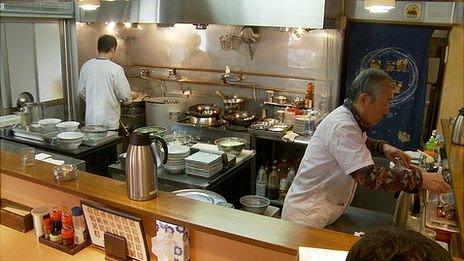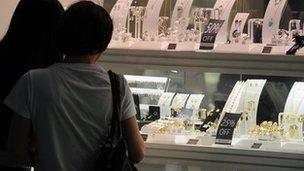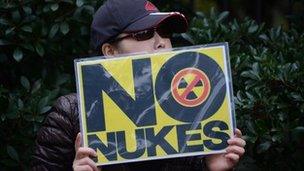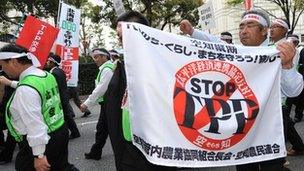Economic policies irk Japanese businesses ahead of election
- Published

Kunio Ueno's small restaurant will feel the effects of three unpopular economic policies being debated in the run-up to Japanese elections
Wanted: A leader who can fix the world's third largest economy. Needs to be able to boost growth, end falling prices, reduce its mammoth debt and weaken the Japanese yen. All the while, keep the voters happy by not resorting to unpopular policies.
The name of a short-lived political party sums up what these unpopular moves are: "Tax Cuts Japan • Anti-TPP • Zero Nuclear". The party only existed for five brief days before merging with another in late November but they are the three economic policies that are on voters' mind ahead of general elections on Sunday.
Small Chinese restaurant Shoraku is one of many businesses in a residential area of Tokyo that is affected by all three. It is run by the Ueno family, originally by father Kunio and now by his son Koji.
First unpopular move
A hike in the consumption tax shoppers must pay on everything they buy. It is currently 5% but the Prime Minister, Yoshihiko Noda, along with the two main opposition parties, pushed through a bill to raise it to 8% by 2014 and 10% by 2015 in August.
It is a move which 73-year-old Kunio Ueno definitely doesn't support.

Analysts say a tax hike is one of the few ways for Japan to fund a social security system
"Big businesses may be able to pass on the hike to consumers but we cannot raise prices because we'll lose customers," he says.
"We haven't changed prices since the sales tax was 3% so we've already absorbed the hike of 2%."
"I guess you could reduce the quantity in each dish but that feels like betraying our regulars," he adds.
The consumption tax hike is often seen as political suicide because almost every administration that suggested or imposed the introduction or the hike of the tax failed to win the next general elections.
Mr Noda said the hike was necessary to rebuild Japan's finances. But more than 50 lawmakers from the ruling Democratic Party of Japan opposed the bill, resulting in their departures and the formations of many small political parties.
Second unpopular move
A huge new free trade area around the Pacific ocean called the Trans-Pacific Partnership (TPP). The pact began six years ago and its current members are Australia, Brunei, Chile, Canada, Malaysia, New Zealand, Peru, Singapore, Vietnam, Mexico and the United States.
Participation has been discussed in Japan for many years but the Mr Noda expressed Japan's desire to become a negotiating partner earlier this year.
To put it simply, big businesses and exporters support the move. Farmers and their strong unions strongly oppose it.
"Made in Japan" produce is known to be much more expensive than its overseas rivals and without tariffs on imports, many farmers would struggle to survive global competition.
It could mean cheaper vegetables and rice for the restaurant owner Mr Ueno, but he is against Japan joining the TPP.
"We value our long relationships with the suppliers so we don't want to see them struggle," he says.
"Even if cheaper overseas rice became available, we would continue to buy from Japanese farmers that we always bought from."
Third unpopular move
Nuclear energy, whether Japan should abandon it altogether. Before the accident at the Fukushima nuclear power plant in March 2011, nuclear accounted for 29% of Japan's electricity supply. But in the past 21 months, the anti-nuclear movement has been gaining momentum.

The anti-nuclear movement has been gaining momentum since the Fukushima nuclear disaster
All but two nuclear reactors remain shut. It means that Japan has been importing other sources of energy. Japan now buys a lot more products from overseas than it sells abroad and the gap between its exports and imports - called trade deficit - has been widening.
It has also resulted in a hike in electricity prices. Big businesses want Japan to continue using nuclear power to reduce the impact on the economy but a large number of protesters have been taking to the streets every week.
Small business owner Kunio Ueno is also against nuclear power plants even if it means he will have to pay even more for electricity.
"We have to look at a longer term goal and we don't want to have any more accidents at nuclear power plants," he says.
"We changed our light bulbs to save energy and to cut costs."
"In the 35 years that I've been running this restaurant, this is the worst that I've ever seen."
"I don't mind who becomes the leader but I want someone who can make things better, or at least not make them worse," Mr Ueno adds.
And this is the challenge that the parties face - tough economic issues on which tough decisions have to be made. But would taking these decisions make them unelectable?
So what are the stances of Japan's main parties vying for 480 seats in the lower house of parliament on 16 December?
"Not so different," says Yuuki Sakurai, of Fukoku Capital Management.
Let's start with the ruling DPJ. It pushed through the sales tax hike and Mr Noda said Japan should join the TPP. As for nuclear energy, after changing its position a few times, it has promised to phase it out by the 2030s. And voters see Mr Noda as someone who has restarted the first nuclear reactors since the Fukushima accidents.
Its main opposition Liberal Democratic Party of Japan (LDP) supported the tax hike in August. Its leader Shintaro Abe has recently said in a television debate that the hike is not definite, but most analysts believe Mr Abe will raise the tax once he is in office. The LDP wants Japan to join the TPP if tariffs on imports are not removed and it says Japan would need some forms of nuclear energy.

Farmers are against the TPP because cheaper produce from elsewhere would enter the market
Economic policy of the fringe parties that are expected to form part of a coalition remains vague, although the Japan Restoration Party - a tie-up between two populist figures - backs the sales tax rise to fund local governments.
"Those policies may be unpopular but they would eventually support the country's economy," says Kiyoaki Fujiwara, the director of the Economic Policy Bureau at the Japan Business Federation or Keidanren.
"We think it is inevitable to raise the consumption tax to fund the social security system as our population ages quicker than anywhere else in the world."
"We also support Japan joining the TPP because we have little natural resources and our economy grew by selling goods and services to the rest of the world."
"Having free trade with the growing Asia is crucial and I believe joining the TPP is the first step," he adds.
For Japanese voters, coming to grips with difficult economic choices may be what is needed to jolt their nation out of ongoing stagnation. But it is something not many want to hear.
- Published10 December 2012
- Published12 November 2012